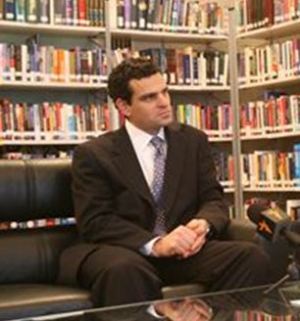
Obama names fool to lead on terror finance, sanctions
January 28, 2011 The White House has announced that Stuart Levey, the Treasury Department’s Undersecretary for Terrorism and Financial Intelligence, will resign. His replacement will be Democrat lawyer David S. Cohen, the current Assistant Secretary for Terrorist Financing. Cohen doesn’t deserve his current job, much less a promotion. The Republicans in the Senate need to resist and grill Cohen during confirmation hearings. Here’s why:- Cohen has praised Treasury’s efforts at containing terrorist financing to Al Qaeda while failing to recognize the contribution of the U.S. military in the war against terrorism. It is largely the military pursuit and elimination of insurgent and terrorist financiers and cell leaders that has pushed Al Qaeda closer to insolvency. It has not been the men in navy blue suits inside the beltway.
- Cohen “is pleased with the contribution that Saudi Arabia” has made in combating the financing of terrorism. Pleased? Cohen’s statements on Saudi Arabia are for public show and border on outright lies. His statements to more than one media outlet have been made to highlight a spirit of cooperation with the Muslim world and to paint a picture of Pres. Obama’s effectiveness at using “soft” power. The reality is that Saudi cooperation in the financial war on terror is limited to public statements, meager proof, and multiple examples of Saudi duplicity. Relatedly, Cohen has downplayed the role of the Middle East in international terrorist financing. At a speech to the Washington Institute for Near East Policy, Cohen addressed terrorist financing problems in Mexico, North Korea, Africa, and getting slightly closer, Afghanistan and Pakistan. He spoke some about Iran and Hezbollah, ignored Yemen, and left out Saudi Arabia’s role in funding Al Qaeda and the Taliban entirely.
- Cohen supports Carl Levin’s dreadful incorporation transparency bill which would deepen the federalization of what has historically been a state role—the incorporation of businesses. The bill would require additional disclosures by companies, additional paperwork by the state incorporation agencies, and would subject the states to turn over records on their businesses to Washington, D.C., and even to foreign countries upon request. Contrary to what supporters say, the bill would not help expose the Iranian or terrorist shell companies of tomorrow—it is a bill designed to discourage foreign companies to offshore their revenues in the U.S. in the vein hope that foreign countries will reciprocate by helping the U.S. crackdown on its own tax deadbeats. Cohen’s support for the bill was a deviation from the Treasury policy stated by another assistant secretary who testified under oath before Congress that no new laws are necessary to fight terrorist financing. Cohen’s position also put him at odds with current FinCEN director Jim Freis, who has a less rigid approach toward beneficial ownership. That makes Cohen the odd man out among the assistant secretaries he will be supervising if confirmed.
- More broadly speaking, sanctions are the last bow in Pres. Obama’s quiver against a nuclearizing Iran. Either the Obama administration is or is not serious about enforcing those sanctions, about bringing more nations on board with those sanctions (particularly Europe and Russia), and about keeping the sanctions tight. Letting the well-respected Levey go and selecting a lightweight like David Cohen suggests that Pres. Obama is no longer serious in this approach. More menacingly, that suggests that the Obama administration no longer has a genuine plan for containing Iran’s nuclear ambitions.
Really, Tim? But is it not informative that the question is being asked?
About these ads

No comments:
Post a Comment